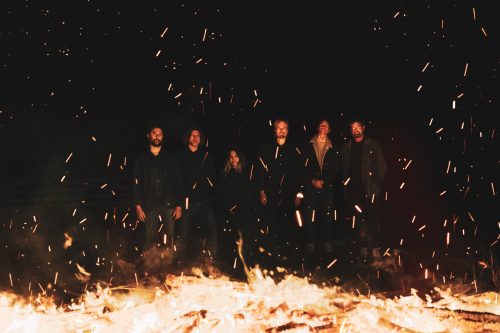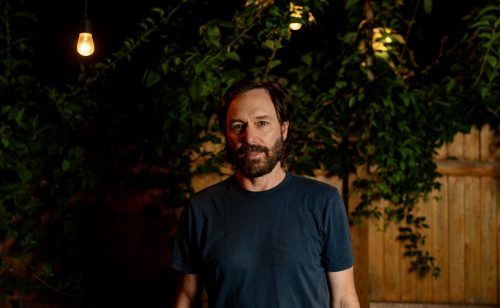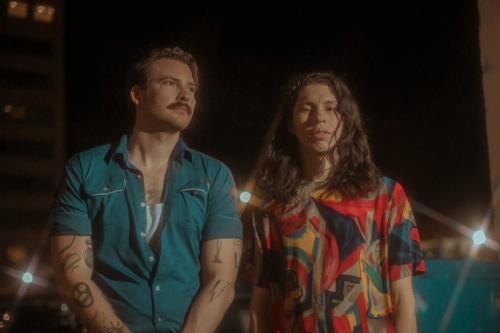To move forward, The Head and The Heart had to go backwards. Back to how they worked when they were a scrappy young crew emerging from open-mic nights in Seattle: doing it by — and for — themselves.
For their sixth album “Aperture,” the sextet decided to self-produce for the first time in nearly 15 years, when the indie-folk band recorded its self-titled debut for Sub Pop. It was also the first time they were outside the machinery of major label Warner Bros since starting a five-album span that ended with 2022’s “Every Shade of Blue.”
The results sing for themselves; the return to self-determination is proclaimed on the “Aperture” track “Arrow”: “I am my own arrow, I am my own home.”
Newly signed to the Universal imprint Verve Forecast, singer and guitarist Jonathan Russell, bassist Chris Zasche, pianist Kenny Hensley and drummer Tyler Williams convened in a Richmond, Va., studio to build “Aperture” from the ground up. Charity Thielen (vocals, guitar, violin) and Matty Gervais (guitar, vocals) had their second baby just two weeks earlier, initially staying home in Seattle before linking up.
“Ideas started flying out of us because we were sort of in the room together for the first time without any real starting points, if you will,” Williams says. “No kind of inspiration to start. We just kind of were looking at each other like, all right, who’s got anything in their minds that in this moment feels relevant to where we are? And things just started pouring out very spontaneously.”
In advance of The Head and The Heart’s concert at Central Park Summer Stage on July 30, we chatted with Williams about the troubles the band endured under Warners, how self-producing eliminated “shortcuts” in the studio and how the group known for heartfelt anthems like “Rivers and Roads” has maintained a tight relationship with its fans as its profile has grown.
Self-producing gives you freedom, but was there a challenge in keeping things on the tracks without a traffic cop in the studio?
I think we’re good at that, actually. I think that’s where our strong suit is: we know what this should sound like. All six of us are usually on the same page with that. I think getting to that point when you work with a producer, you almost take, like shortcuts, where the producer, whoever they are, will kind of guide you and they’ll kind of insert themselves into the discussion almost prematurely, where (when producing ourselves) we have to sort of do the work in the room together to get to the place where we all feel happy with the song. So I think for us, the six of us in a room and hashing things out, really deliberating, that’s part of the process of making a great record. And I think when we’ve worked with producers, they have great ideas, but it also feels a little bit like you’re taking the shortcut.
Did you feel pressure from Warners, or is it something you noticed in hindsight?
We definitely noticed it in the moment, for sure. I think it really put the band on edge for a long time where we weren’t trusting of each other enough because there were people telling us, “hey, this person doesn’t know what they’re talking about, so you shouldn’t listen to them.” And it’s like, what? The band had to recalibrate our dynamic and [go to] therapy. We had to go through a lot of therapy because you pretty much get brainwashed into thinking that if you don’t have a hit song or you don’t have, like this big thing, your career is going to fall apart. I think that we had to look at that and be like: “Actually, you’re wrong. And we did this. We did this by ourselves for the first record. You know, we made that record on our own, and people really love that album. So why can’t we do that again?” It was always like trying to overcome the meddling of outside influences.
What would qualify as a “hit song” for a band like yours?
That’s the thing. Nobody knows. It’s a shot in the dark. And if you don’t believe in the song that you’re putting out, then it’s never going to be a hit. And if it is a hit, you’re stuck with it, playing it for 40 years or whatever. It’s not fun. So I think at the end of the day, we really just realized we have to follow our intuition and our ideas, because that’s the only way that this is going to be satisfying to any of us, you know?
Do you think Warners signed you because of who you were or who they thought you could become?
I never know. Yeah, I never got the answer to that because as soon as you get there, they want you to do things differently. And so we never really understood if they wanted us for who we are or wanted to mold us into something that they thought would sell or whatever. And you know, it’s the same people behind like Benson Boone and all that stuff. So it makes sense. You’ve got this moldable kid, but I think we had already established ourselves as really pure artists at that point. I think Charity says it the best on the song “Finally Free.” That song to me is about the whole time there.
You’ll be headlining a show here in New York at Central Park. What does that mean to you?
I mean, you see the legends [who have played there], right? You see Paul Simon and Chaka Khan and all these amazing artists who have done it before us, and it’s pretty mind-blowing to be where we are and get to play some of these venues that are just so storied. I grew up with Paul Simon, I think we all did in this band. And his Graceland performance was just unbelievable. It’s legendary. I hope we can even come up with a 10th of the brilliance of that performance, so we’ll see.
Another special one: a hometown one at the Mariners’ stadium, T-Mobile Park, with The Lumineers on Aug. 16.
It’s pretty wild. I think one of the last times we played [in Seattle] was the Pike Place performance on top of the market, and you sort of pinch yourself and you’re like, is anything going to feel this good again? But I have a feeling T-Mobile is going to outdo it. We’ve already been talking about it. We’ve already been planning some stuff, and just the energy within the band, I know we’re going to hit that stage and just dominate it, so I’m excited for that one for sure.
Has it been challenging to maintain a connection with your fans as the band has grown into playing these larger venues?
I think we’ve always prioritized making the connections with the people who are coming to a lot of shows and who are super active. We want that to be deeper. We remember everyone’s names and we will send them little gifts and stuff. And it’s about making that connection as deep as possible, because these are people who your music has touched and they’re coming to see you play these songs and there’s this relationship there. We don’t shy away from connection on Facebook or with our fan page there; it’s pretty popular. And we do this VIP thing now where people show up early and we do a question-and-answer and play a bunch of song requests for them acoustically, and it’s just become part of the highlight of our day. When you walk on stage, you remember those faces and you see them in the crowd, right? You know their names and you’re like, I know who you are now, and you’re breaking down that barrier.
I don’t think we’ve ever been a band where we want to be put on a pedestal, where we want to be seen as “other than” or more special than anyone else. I think we want to be a band of the people and a group who are there to change lives and not be worshipped, you know?




Leave a Reply